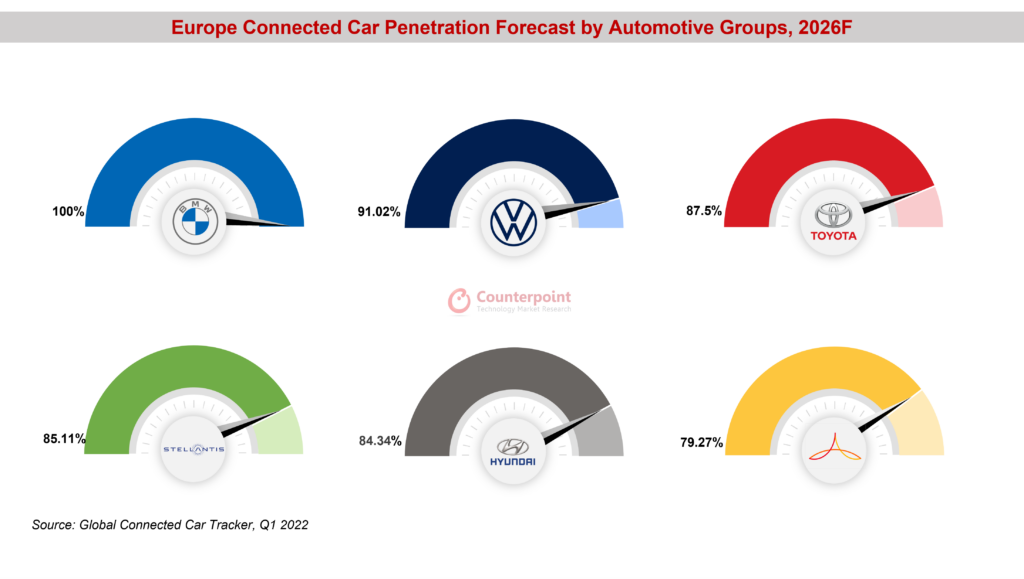- 4G car market share will hit the high of 91% in 2022 before declining.
- 3G car market share will be in a continuous decline after 2021.
London, San Diego, Buenos Aires, New Delhi, Hong Kong, Beijing, Seoul – June 15, 2022
Europe’s connected car* market bounced back in 2021 after the pandemic-induced downturns. However, the ongoing semiconductor shortage led to production losses which prevented the continent’s overall automotive market from returning to pre-pandemic normalcy. According to the latest research from Counterpoint’s Smart Automotive Service, Europe’s connected car market grew 16% YoY in 2021 to cross 8.6 million units, with Germany leading the charge followed by France. In terms of most 4G cars shipped, Germany was at the forefront followed by France and UK. 5G cars are expected to take center stage going forward.
Commenting on the European automotive market’s performance, Research Analyst Fahad Siddiqui said, “The rapid electric vehicle (EV) uptake in Europe is not only aiding automakers in meeting the CO2 emission targets and providing attractive deals to customers through government subsidies but also helping increase the connected car penetration. The market share of battery electric vehicles (BEVs) and plug-in hybrid electric vehicles (PHEVs) with respect to EV sales stood at 38% and 29% respectively in 2021, with the leader in the BEV market being Tesla followed by Volkswagen and then Renault. OEMs are introducing more EV models to remain future-proof. In addition, having a mix of ICE (internal combustion engine) vehicles and EVs in their portfolios means they can continuously upgrade their expertise in the electrification domain and potentially gain market share.”
After witnessing a decline in 2020, Europe’s connected car market performed well last year registering a yearly growth of 16%. The top three automotive groups in 2021 were Volkswagen, Stellantis, and BMW. Volkswagen was heavily affected by the chip shortages, which restricted sales and resulted in low inventories with dealerships. Within Volkswagen Group, connectivity penetration for Audi and Volkswagen brands stood at 90% and 52% respectively with the latter shipping a higher number of connected cars. Being a luxury automaker, Audi enjoys a higher connected car penetration rate with more connected cars in its fleet. The countries where these brands performed best were Germany followed by the UK.
Senior Analyst Soumen Mandal said, “In 2021, China led the EV market, followed by Europe. By 2026, Volkswagen Group is likely to be dominant, followed by Stellantis and the Renault-Nissan-Mitsubishi alliance. In terms of market share, Volkswagen will account for almost 20% of the total market. All other automotive groups are likely to account for less than 15% share.”
Mandal added, “Next-generation connected cars were already visible last year, with the first global 5G car hitting the roads in November. The automobile industry is pivoting towards new vehicle architectures and software will play a key role in this. Software-defined vehicles will employ emerging architectures in the form of zonal distribution of ECUs (electronic control units) with cross-domain functionality, less wiring, and high-performance computers. Furthermore, in the next few years, upgraded network infrastructure will help cars to communicate with networks and with each other to complement the increased autonomous driving efforts. This may help to counteract growing congestion and will be an important part of smart city developments.”

Keeping the technology evolution in mind, Research Vice-President Neil Shah said, “Currently, 4G technology can support good data throughput and specialized connectivity for applications related to telematics, predictive analytics, and infotainment in a connected car. However, as electronics in cars are advancing rapidly to cater to higher speed and more data-intensive applications, 5G will play a crucial role in enabling next-level connected mobility. Around a third of cars sold in Europe in 2026 will have 5G connectivity. The leading 5G car brands will be BMW, Stellantis, Volkswagen, and Ford. Ford will introduce 5G connectivity in the US in 2022 followed by other markets later in the year. Volkswagen is expected to introduce a 5G car by the end of 2023, while Stellantis will do so by the end of this year.”
*The connected car data here refers to only passenger cars with embedded connectivity.
The comprehensive and in-depth ‘Global Connected Car Tracker, Q1 2019-2026F’ is now available for purchase at http://report.counterpointresearch.com/. Feel free to reach out to us at press@counterpointresearch.com for questions regarding our latest research and insights.
Background:
Counterpoint Technology Market Research is a global research firm specializing in products in the TMT (technology, media and telecom) industry. It services major technology and financial firms with a mix of monthly reports, customized projects and detailed analyses of the mobile and technology markets. Its key analysts are seasoned experts in the high-tech industry.
Analyst Contacts:
Related Posts:
-
Tesla Reports Record Revenue in Q1 2022; Rising Raw Material Cost a Challenge
-
NXP Sees Record Revenues in 2021; Automotive Segment Leads the Way
-
How Connected Vehicle Data is Shaping the Automotive Industry
-
Global Semiconductor Shortage Likely to Ease Significantly in H2 2022 Despite China Lockdowns

